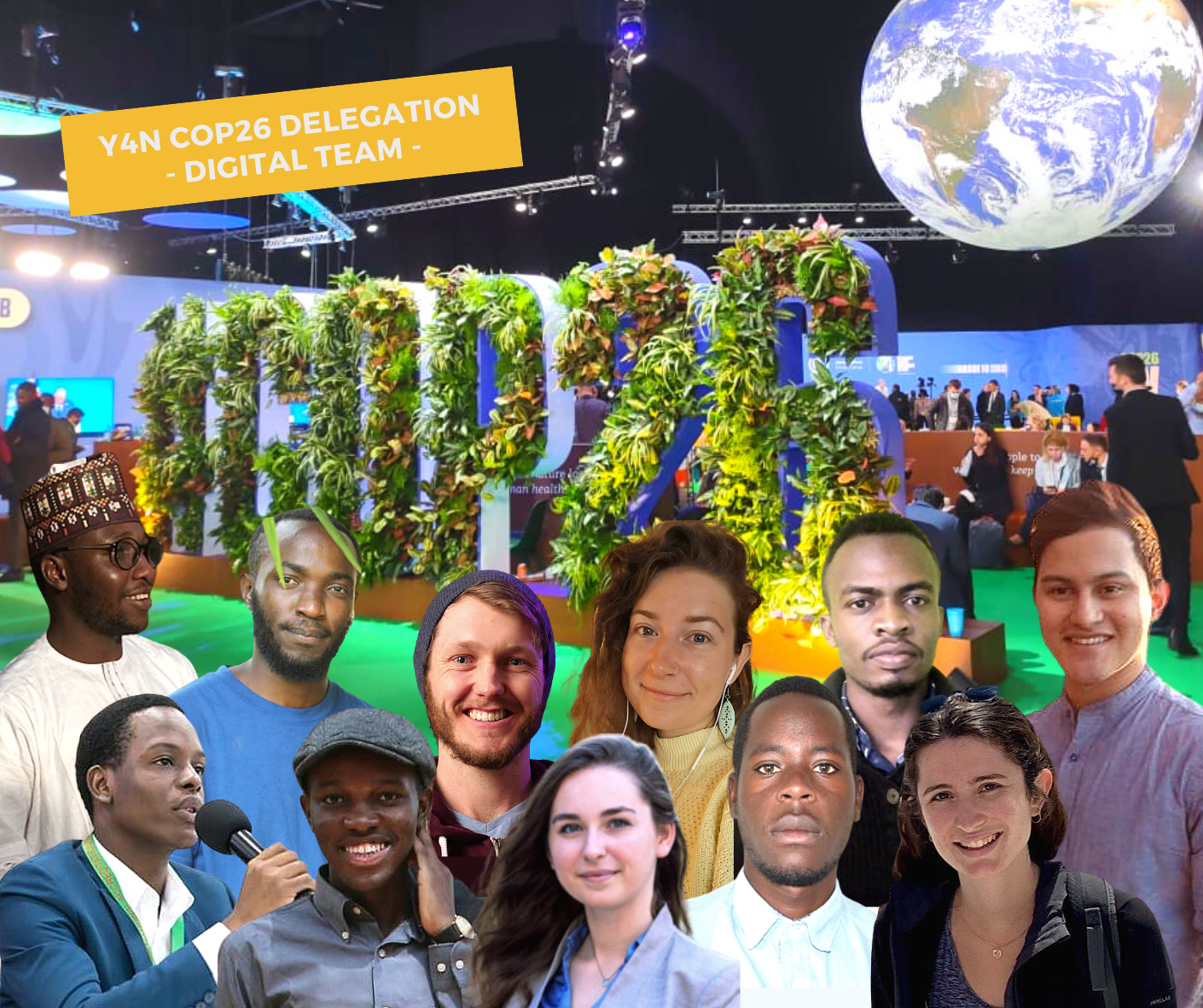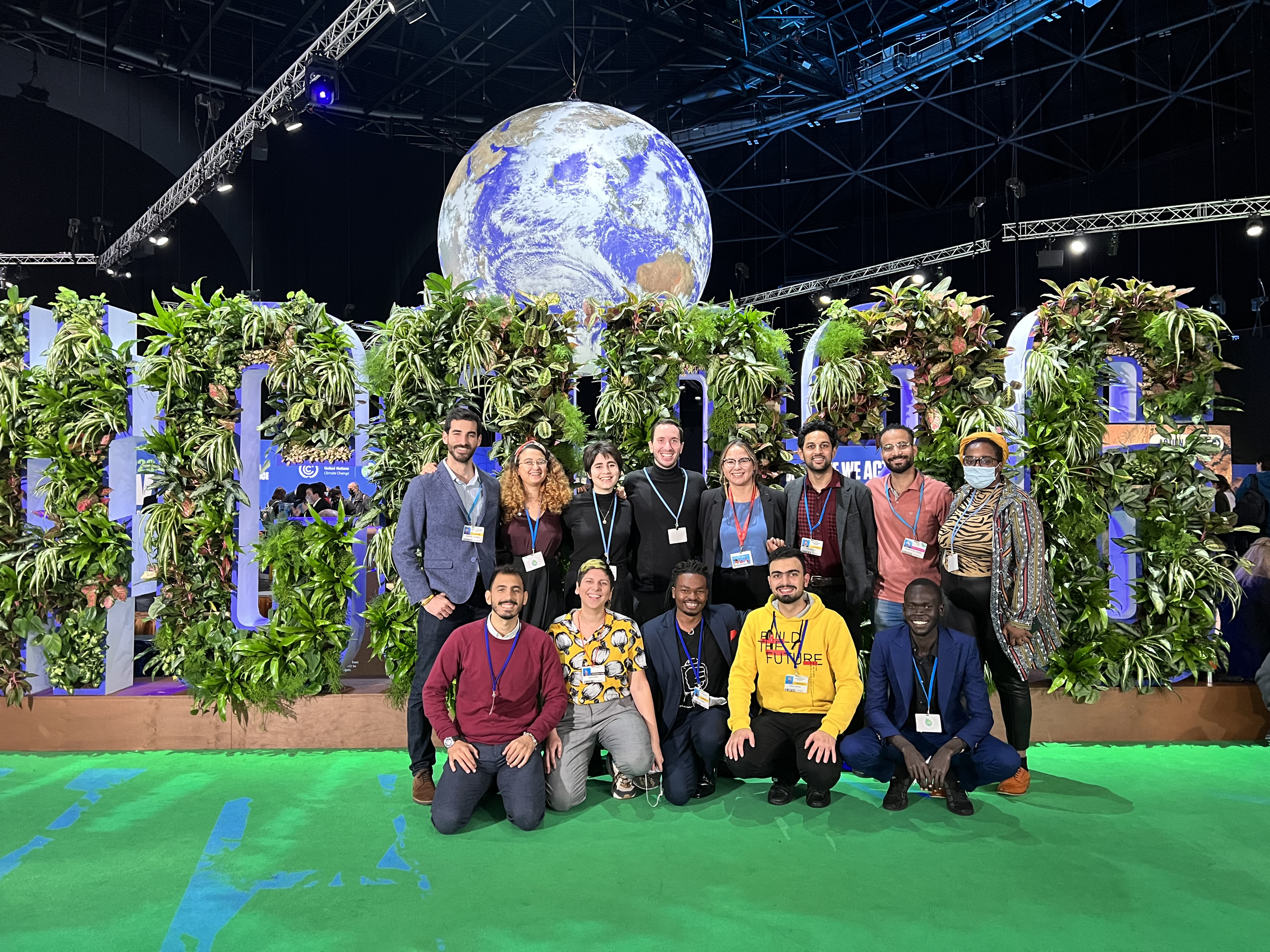It has been one month since COP26. It is sometimes hard to grasp how quickly COP rushes up, and then past, us. Since we returned to our homes, we have been taking time to share, download, debrief, and reflect together as a team and individually. And now we want to share with you!
First of all, we have to share big gratitude with our incredible Y4N COP26 Delegation. Our in-person and digital teams showed up with beautiful visions for our shared future, collaboration and learning front of mind, and compassionate support for one another. In Glasgow and from our homes across the globe, we championed our goals - to centre justice, accountability, and solutions and to uplift and build out space for youth. We are proud of this work and of each other!
Secondly, the Glasgow Climate Pact. It is many things. It simultaneously includes some topics - from youth to coal - for the first time ever, while also neglecting much of the ambitious implementation guidance that the most affected people and areas were calling for. Dig into the details of youth and nature in the Pact with the Y4N Policy Taskforce!
Now, keep reading to enjoy some personal reflections from our team members about their experiences at COP26. Reflection is the action that turns experiences into meaningful and personal learning. From navigating COP26 as an Indigenous youth to planting Gingko trees in Glasgow to building solidarity in our movements, these reflections are powerful opportunities to see the world in new ways and listen deeply to our community.
Be sure to share your reflections from COP26 in the comments below!
The Land is Living
Reflections from Sarah Hanson
Indigenous People have been taking care of the land since time immemorial. Before the colonization of the America’s, these lands that my people, the Anishinaabeg, call Turtle Island were abundant and “untouched” by man. We see the land as living, with no hierarchy between us the walking, the animals, and the various plants and waterways that make up what’s currently known as so-called Canada and so-called United States. We live in a reciprocal relationship to the land and everything that calls it home.
During my time at COP26, I saw this relationship questioned and twisted to fit narratives that economically benefit those who’ve created our current climate crisis, state governments and corporations. I went to COP26 as part of Indigenous Climate Action’s delegation, working on the Policy Team as a Youth Representative inside the Blue Zone. Through this experience, I was privy to conversations and interventions by Indigenous People from all over the world that showed the negative impacts of climate policies like Nature-Based Solutions, Carbon Pricing, Net Zero and others. Before going, I was aware that this space wouldn’t be welcoming to an Indigenous person, let alone a youth. Being with Indigenous Climate Action, who is heavily involved with the Indigenous Peoples Caucus, helped to safeguard me. I was surrounded by like-minded people with similar life experiences, who understood my frustrations without having to explain them. Along with all the other experience Indigneous Climate Action provided, I left COP26 with a sense of excitement for the future to come. Small but monumental changes happened this year at COP26, with synergies between the work we do at Youth4Nature and my time spent with Indigenous Climate Action showing that our youth generation will create change that ensures Indigenous Rights and People are at the forefront of climate policies.
In his personal blog reflections, Joshua breaks down the positives, the challenges, and the concerns from his experiences at COP26.
For the first time, discussions regarding nature; nature-based solutions took core suit in the COP space, highlighting the relevance of taking nature into account when addressing the climate crisis. Practitioners acknowledge that the climate crisis cannot be tackled in silo. In order to build back into a green and resilient economy, the twin climate and biodiversity crises need to be addressed as a whole.
alliances & actions: Brazil at COP26
Reflections from Gaby Baesse
Photo by: ClimaInfo
COP is a space that exists in contradictions. On one hand, it brings people together from everywhere to talk about solutions and make important decisions for the climate crisis. On the other hand, only a few (country) parties are actually making those decisions, and those decisions have still not materialized into real actions.
I believe that the Brazil case is a great example to learn from. The Brazilian Government brought the biggest country delegation to COP26 (the largest delegation was the fossil fuel industry - larger than any country and yes, you guessed, the main sector that is causing global warming. Oh the contradictions!). Led by a climate denier far-right government, the Brazilian Government delegation was there to greenwash their image, trying to appear more reasonable at the same time that has been promoting governance of ‘total extractivism’ that increases the deforestation, dismantles environment laws, contributes to the genocide of Indigenous and Black people, attacks NGOs, scientists and environmental defenders… we could go on with the list of atrocities. This same government had a huge pavilion at COP.
Civil society, on the other hand, was not only not invited, but when youth tried to talk they were silenced, while Brazilian government has a seat at the negotiations table. But, civil society in Brazil has been fighting back! For the second year, the Brazil Climate Hub was present, hosting a pavilion organized by Brazilian civil society to promote climate action and advocate for real solutions. At COP26, the pavilion was even bigger than COP25 and there was also the biggest group of Brazilian youth at a Climate Conference - more than 80 youth from north to south!
The climate crisis deepens, the planet suffers from several collapses: capitalism, authoritarian governments, colonialism… While we face the cliff, it is time to do as Brazil, let’s strengthen our alliances and actions.
“The private sector and businesses had a strong presence at COP26, especially compared to other UNFCCC COPs. Many representatives from the sector had privileged access to pavilions and negotiations and abundant resources to engage the full two weeks. […] Because of this, and because there is still a gap in youth organization around the private sector, it is essential to have groups like Youth4Nature’s Private Sector Taskforce represented at COP26 to share our perspectives and priorities.”
An excerpt from the reflections of the Y4N Private Sector Taskforce about our event in the EU Pavilion.
A Gingko Tree in Glasgow
Reflections from Kaluki Mutuku
COP26 was my second COP, consecutively happening in a Global North country. A conference that’s meant to make pragmatic steps and actions to address the dire impacts of the climate and climate crises eating many African communities. Yet, from the word go, it felt so foreign to even get into the conference facilities. Too many different things taking place, yet too distanced from one another. Negotiators mostly in their “spaces”, civil society and other groups around their pavilions, and perhaps a few moments to truly interact. For a youth, for me, this came with a lot of despair, anxiety, shock, and a touch of disappointment. Yet, it felt warm to connect with and host actions with other groups and join on the streets to demand nuanced climate action out of the Glasgow conference. I went, I spoke, I gave interviews, I contributed as a speaker to a couple of side events, I led in the planting of a historic Gingko tree, and I shared moments inspiring and getting inspired, as well as pitching to individuals and groups to support youth-led and grassroots works.
It sure felt exhausting, but it was worthwhile to be amongst the Youth4Nature family, fellow youth and youth allies, and connect with leaders who are taking courage to lead action on climate change strategies, especially from Global South nations. I haven't stopped thinking and wondering how world leaders watered down phasing out fossil fuels, to phasing down! But either way, I know now that I am back home, in the region, I must continue the work, I must keep leading from the grassroots, and I must push for meaningful co-leadership in restoration and advocacy spaces in Africa.
Community Support & Solidarity at COP26
Reflections by Raysa França
To Protect Who we are
Reflections from Fernando Morales
COP26 has come to an end. With nearly 200 countries in dialogue and countless hopes on the table, for another year it seems that the fate of humanity has been negotiated in little more than a cup of coffee. Here are some thoughts on my return from COP26:
COP26 is perhaps the most advanced global governance mechanism for turning planetary society towards a scenario in which prosperous living is possible. The difficulty of coordinating and agreeing on outcomes among all the parties representing the world must certainly be acknowledged and, with that, this text recognises the progress that has been announced: commitments to reduce deforestation, methane, and carbon and the closure of the Paris Agreement's roadmap to continue reducing emissions by 2030.
However, these results may be insufficient in the face of a house on fire, or so claim those who are living the impacts of the climate crisis on the frontline. Who better than them to come up with measures to address the problem? Indigenous communities, youth, and civil society, especially from the Global South, have deployed uncontainable energy on the doorstep of the negotiations to convey the urgency and suffering of having seen first-hand how climate can affect the way we live. Is this a reflection of a lack of political empathy? Far from seizing the opportunity to do climate justice and deliver on Loss & Damage finance, richer countries are throwing up their hands when it comes to assuming their historical responsibilities in the climate crisis.
With all this, we are on track for a 16% increase in emissions over the next 10 years while the science tells us that we need to move in the opposite direction and reduce emissions by up to 45% to stay at a relatively safe threshold. This decade is a crossroads where the system we have created needs unprecedented transformation, so much so that expecting top-down global governance to take the lead may be naïve. So what is left?
People say that this has been the year of nature at COP26. Perhaps the great leap we need is social transformation at all levels that values the direct benefits to our existence that healthy ecosystems offer us: the water, air, or food that allow us to live healthily, over comfort and status quo. And this is already happening on an unprecedentedly massive scale - communities are waking up. The refuge of hope we have left is the great awakening that pushes us to protect who we are. Because we are nature.






